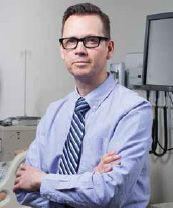By Craig Dale (Phd 2013)
I have come to believe there is a need to enhance nursing knowledge in oral health practice, education, and research.
In 2002, I was a critical-care nurse helping recruit participants for a study investigating how best to diagnose pneumonia in mechanically ventilated patients. The oral tubes, dehydrating treatments and stress these patients encounter diminish the presence and protective role of saliva and beneficial mouth bacteria. The resultant overgrowth of harmful oral bacteria can cause systemic disease, including pneumonia. Pneumonia doubles the risk of death in this population and often requires treatment with powerful antibiotics.
 It took me a long time to realize my focus and energy may be of better service in preventing pneumonia, rather than diagnosing it. Fast forward 12 years to 2014, and I have completed a doctoral study that explores oral care as a major factor in preventing ICU-acquired pneumonia in patients who are mechanically ventilated. There is no gold standard for oral care in this vulnerable population, making it difficult for nurses to know how to perform it properly.
It took me a long time to realize my focus and energy may be of better service in preventing pneumonia, rather than diagnosing it. Fast forward 12 years to 2014, and I have completed a doctoral study that explores oral care as a major factor in preventing ICU-acquired pneumonia in patients who are mechanically ventilated. There is no gold standard for oral care in this vulnerable population, making it difficult for nurses to know how to perform it properly.
This knowledge gap opens an important space for nurses in research and practice to collaborate in preventive oral care. As antibiotics are no longer the default solution, nursing research is the best method to bridge this serious gap in health prevention and promotion.
Beyond the ICU, without question the mouth is a sensitive boundary and has a lot to say about our health as individuals and as a population. Despite the phenomenal influence of the Ottawa Charter for Health Promotion, 1986 in reorienting health care toward a socio-ecological framework, there is more work to do to make known the connection between oral and systemic health. The mouth contains a complex microbiome that has a natural balance that’s easy to upset. Poor oral health upsets the balance and can cause systemic illnesses, such as cardiovascular disease and pneumonia.
Oral health is anchored in the social determinants of health, as any toothless smile will tell you. Limited access to oral tools, such as a toothbrush and floss, or being highly dependent on caregivers for daily oral care poses risk. Not having a place to live, running water or an adequate diet renders oral health impossible.
With the lack of universal funding for preventive oral care in Canada, the mouth is critically disconnected from the body. If nurses voice their concern about the disenfranchisement of oral health, it will be an important step toward safeguarding our patients and health resources.
Craig Dale received two awards for his doctoral work, including the Doctoral Dissertation Award from the Council of Ontario University Programs in Nursing. Bloomberg Nursing welcomed Dale to the faculty as an assistant professor in January 2015.
This story originally appeared in the Fall/Winter 2014 issue of Pulse Magazine.
PHOTO: Jacklyn Atlas